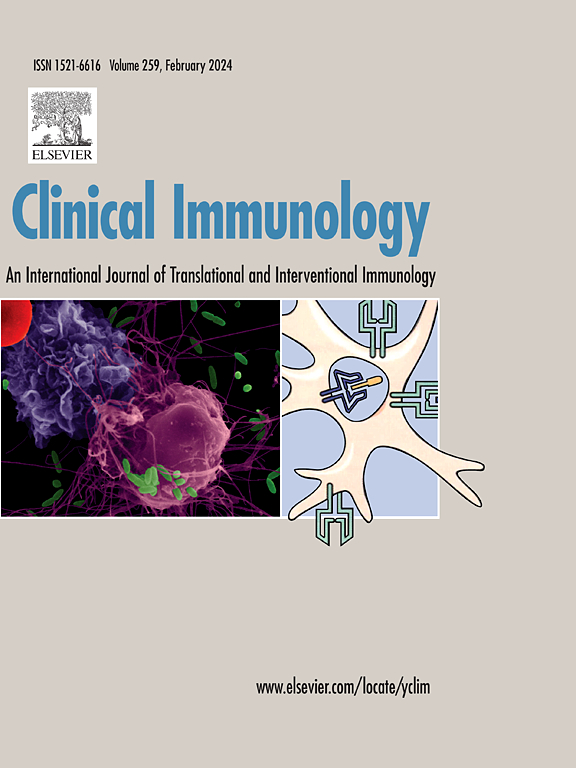Novel pathogenic MAN2B2 variants cause systemic lupus erythematosus and dysregulated glycosylation
IF 3.8
3区 医学
Q2 IMMUNOLOGY
引用次数: 0
Abstract
Genetic factors have been demonstrated to play essential roles in the pathogenesis of systemic lupus erythematosus (SLE). Identifying novel disease-causing genes of SLE helps to reveal its molecular mechanisms and new therapeutic targets. In this study, we identified biallelic loss-of-function variants of MAN2B2 gene in five unrelated SLE patients by whole exome sequencing. They were characterized by autoimmunity, glomerulonephritis, leukopenia, and immune dysregulation. All variants were absent or ultrarare in population databases and predicted to be damaging by multiple in silico tools. Functional study showed that all the identified variants resulted in complete or partial enzymatic activity loss. Analyses of MAN2B2 knockout HEK293T cells, patient-derived induced pluripotent stem cells (iPSCs) and serum samples revealed defects in glycan degradation and N-glycosylation. The patients exhibited enhanced inflammatory signatures, especially the type I interferon and NF-κB pathways. Mechanically, MAN2B2 deficiency leads to dysregulation of unfolded protein response (UPR) upon endoplasmic reticulum stress, resulting in enhanced expression of inflammatory cytokines. Our findings broaden the genetic etiology spectrum of SLE and identify MAN2B2 as a pivotal regulator in maintaining immune homeostasis, paving the way for innovative diagnostic approaches and molecular pathway-specific therapeutic interventions.
新型致病性MAN2B2变异引起系统性红斑狼疮和糖基化失调。
遗传因素已被证明在系统性红斑狼疮(SLE)的发病机制中起重要作用。发现新的SLE致病基因有助于揭示其分子机制和新的治疗靶点。在这项研究中,我们通过全外显子组测序在5名不相关的SLE患者中发现了MAN2B2基因的双等位基因功能缺失变异。他们的特点是自身免疫、肾小球肾炎、白细胞减少和免疫失调。所有变异在人口数据库中都不存在或非常罕见,并且被多个计算机工具预测为具有破坏性。功能研究表明,所有确定的变异都导致完全或部分酶活性丧失。对MAN2B2敲除HEK293T细胞、患者来源的诱导多能干细胞(iPSCs)和血清样本的分析显示,多糖降解和n -糖基化存在缺陷。患者表现出增强的炎症特征,特别是I型干扰素和NF-κB途径。机械上,MAN2B2缺乏导致内质网应激时未折叠蛋白反应(UPR)的失调,导致炎症细胞因子的表达增强。我们的研究结果拓宽了SLE的遗传病因谱,并确定了MAN2B2在维持免疫稳态中的关键调节作用,为创新的诊断方法和分子通路特异性治疗干预铺平了道路。
本文章由计算机程序翻译,如有差异,请以英文原文为准。
求助全文
约1分钟内获得全文
求助全文
来源期刊

Clinical immunology
医学-免疫学
CiteScore
12.30
自引率
1.20%
发文量
212
审稿时长
34 days
期刊介绍:
Clinical Immunology publishes original research delving into the molecular and cellular foundations of immunological diseases. Additionally, the journal includes reviews covering timely subjects in basic immunology, along with case reports and letters to the editor.
 求助内容:
求助内容: 应助结果提醒方式:
应助结果提醒方式:


